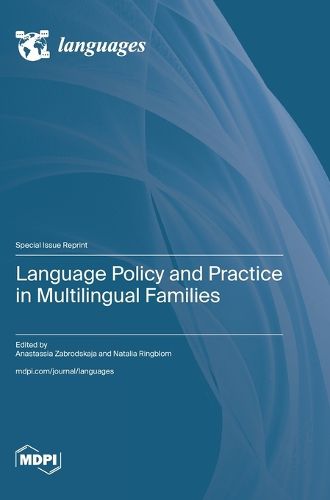Readings Newsletter
Become a Readings Member to make your shopping experience even easier.
Sign in or sign up for free!
You’re not far away from qualifying for FREE standard shipping within Australia
You’ve qualified for FREE standard shipping within Australia
The cart is loading…






This title is printed to order. This book may have been self-published. If so, we cannot guarantee the quality of the content. In the main most books will have gone through the editing process however some may not. We therefore suggest that you be aware of this before ordering this book. If in doubt check either the author or publisher’s details as we are unable to accept any returns unless they are faulty. Please contact us if you have any questions.
This Special Issue explores how language policies-both explicit and implicit-are negotiated and enacted within multilingual families. At its core is an inquiry into how families cope with complex linguistic environments, balancing the maintenance of heritage languages with the pressures and practicalities of integrating into dominant societal language contexts. The contributions illuminate the challenging decisions parents face: whether to preserve their home languages across generations or prioritize a more socially or economically advantageous language. Equally significant is the role of children as active agents in shaping language use at home. Rather than being passive recipients of parental language strategies, children often influence which languages are spoken, how consistently they are used, and in what contexts. This dynamic highlights the interactive and evolving nature of family language policy. Central to the discussions in this Special Issue are the emotional, cultural, and identity-related dimensions of language practices. Language is not only a means of communication but also a vessel of memory, belonging, and personal meaning. The studies presented offer a nuanced view of how family language choices are deeply intertwined with feelings of attachment, cultural continuity, and identity negotiation. By bringing together diverse perspectives and case studies from global contexts, this Special Issue provides a richer understanding of the lived realities of multilingual families and the complex dimensions of language policy in everyday life.
$9.00 standard shipping within Australia
FREE standard shipping within Australia for orders over $100.00
Express & International shipping calculated at checkout
This title is printed to order. This book may have been self-published. If so, we cannot guarantee the quality of the content. In the main most books will have gone through the editing process however some may not. We therefore suggest that you be aware of this before ordering this book. If in doubt check either the author or publisher’s details as we are unable to accept any returns unless they are faulty. Please contact us if you have any questions.
This Special Issue explores how language policies-both explicit and implicit-are negotiated and enacted within multilingual families. At its core is an inquiry into how families cope with complex linguistic environments, balancing the maintenance of heritage languages with the pressures and practicalities of integrating into dominant societal language contexts. The contributions illuminate the challenging decisions parents face: whether to preserve their home languages across generations or prioritize a more socially or economically advantageous language. Equally significant is the role of children as active agents in shaping language use at home. Rather than being passive recipients of parental language strategies, children often influence which languages are spoken, how consistently they are used, and in what contexts. This dynamic highlights the interactive and evolving nature of family language policy. Central to the discussions in this Special Issue are the emotional, cultural, and identity-related dimensions of language practices. Language is not only a means of communication but also a vessel of memory, belonging, and personal meaning. The studies presented offer a nuanced view of how family language choices are deeply intertwined with feelings of attachment, cultural continuity, and identity negotiation. By bringing together diverse perspectives and case studies from global contexts, this Special Issue provides a richer understanding of the lived realities of multilingual families and the complex dimensions of language policy in everyday life.